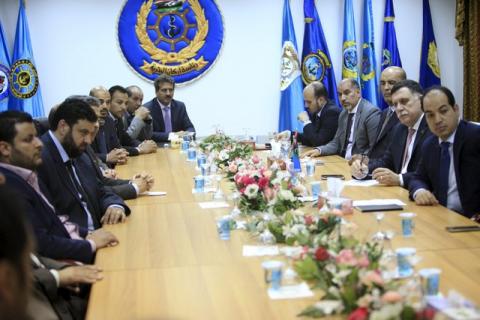Advertisement
Libyan unity government starts work from 'secured' Tripoli naval base
TRIPOLI (Reuters) - Libya's U.N.-backed unity government held meetings at a heavily guarded naval base in Tripoli on Thursday and a senior military official said it was working to secure state institutions in the capital.
The government's leaders arrived at the base by ship from neighboring Tunisia on Wednesday in a high-risk bid to take power, after opponents prevented them from flying in by closing down Tripoli's airspace.
Western powers hope the new government will request and channel foreign support to confront the Islamic State militant group, deal with migrant flows from Libya towards Europe, and restore oil production to shore up its economy.
They have recognized it as Libya's sole legitimate government and called for a rapid transfer of power, but both the self-declared National Salvation government in Tripoli and the rival administration in the east have rejected this.
Tripoli has been mostly calm since the new government's arrival, though a television station that supports the National Salvation government went off the air late on Wednesday and there were brief clashes close to the city center.
On Thursday, members of the unity government's seven-member Presidential Council held meetings at the naval base with political supporters, local council leaders, businessmen and central bank governor Sadiq al-Kabir.
Abdulrahman Taweel, a brigadier general in charge of organizing protection for the new government, described the base as "completely secured".
"We are working to secure all other state institutions," he told Reuters without elaborating. "The Council is here to stay and to continue their work here in Tripoli. They will not leave except for international meetings and will return."
The Presidential Council and the Government of National Accord (GNA) emerged from a deal mediated by the United Nations and signed in December to overcome an impasse that saw rival governments in Tripoli and Bayda competing for power.
The political confusion in Libya since the 2011 fall of Muammar Gaddafi has allowed Islamic State to take hold in and around Sirte, Gaddafi's birthplace, and carry out attacks in several other towns and cities.
NEED FOR BROADER SUPPORT
Critics have questioned how the GNA would be able to start governing without winning broader support and securing a long-sought vote of approval from Libya's internationally recognized parliament in Tobruk.
Tripoli is home to a complex web of armed groups, some of which formed the Libya Dawn alliance that helped the National Salvation government seize power in 2014.
That alliance is now splintered and some powerful brigades have pledged support for the GNA. But others have either not declared their loyalties or said they would oppose it.
Taweel did not say which brigades were working for the GNA, but said it was receiving protection from the army, military intelligence and police.
He said GNA ministers originally from Tripoli were "not under threat and even move around without security".
The GNA's backers argue that as it establishes a presence on the ground, armed groups and public opinion will coalesce behind it and hardline opposition will fade.
"If they can get control of the country's finances, then power brokers who have been sitting on the fence will come in behind them," said a senior Western diplomat.
The GNA's political adversaries have so far kept up their public opposition both in the east and in Tripoli.
In a statement late on Wednesday, National Salvation government head Khalifa Ghwell called the Presidential Council "infiltrators," and said he was giving them a last chance to "leave or surrender."
Libyan Grand Mufti Sadiq Al-Gharyani, an influential figure among some of Tripoli's armed groups, called for the U.N.-brokered deal to be revised and for the GNA to leave the country "before we open the door of jihad on them".
The new government has, however, received the endorsement of the Petroleum Facilities Guard (PFG), a semi-official armed faction that controls key eastern oil installations, some of which it has shut down amid political disputes.
Libya's oil production has dropped below 400,000 barrels per day, less than a quarter of its pre-revolution level, putting increasing pressure on the country's finances.
PFG spokesman Ali al-Hassi said on Thursday that it was prepared to reopen oil terminals at Zuetina, Es Sider, and Ras Lanuf, though he could not say when this might happen. The latter two ports have been repeatedly attacked and damaged by Islamic State militants.
(Additional reporting by Aidan Lewis and Ahmed Elumami; Editing by Tom Heneghan, Toni Reinhold)



















Add new comment